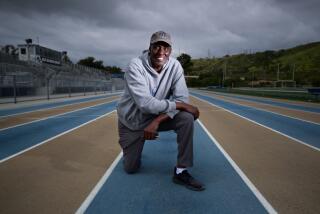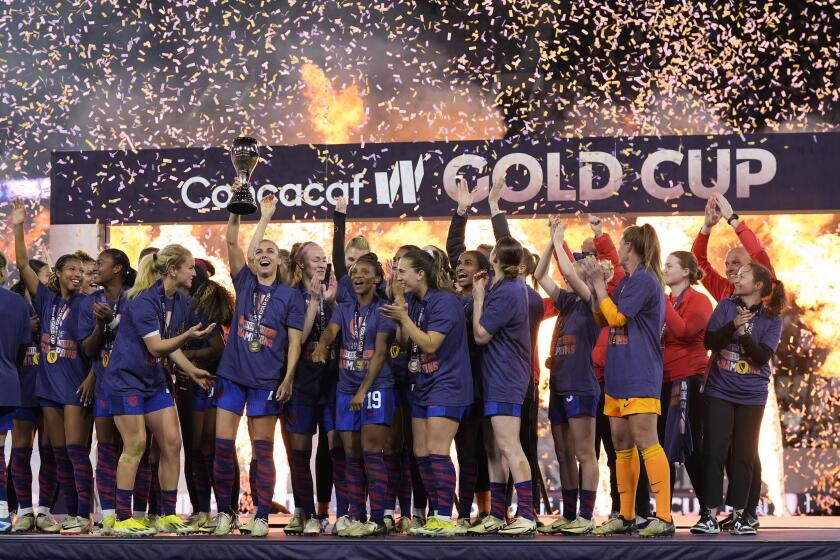Following in the Footsteps of the Original Marathon Man
The road to tonight’s Olympic opening ceremony, some 2,500 years long, began with a single dusty step.
Here, among rolling hills wrapped in olive trees and cradled by the sea.
Here, where in 490 BC a messenger named Pheidippides allegedly began a 26-mile run to Athens with news of a great Athenian victory over the Persians.
Here, where, on Thursday morning, a gray-stubbled man and his leather-skinned parents sit at a table by the side of perhaps that same road, drinking coffee and fingering colorful strands of beads.
“It is good for the Olympics to come back to where they were born,” intones George Barbas in a voice of another century.
Yet this table is bright red, emblazoned with “COKE” and located smack in the middle of George’s gleaming new gas station.
Mother Maria sits in front of Pump 6. Father Anastassius sits in front of Pump 7.
Hurry, Pheidippides. Push “credit” or “debit.”
“The Olympics has always been about an opportunity,” George says, shrugging.
An opportunity, and a responsibility?
A trip along the original Marathon route -- both the name of the current race and its distance were spawned by it -- is a winding metaphor for this internal tug on the Greeks and their Games.
Beginning tonight with an opening ceremony celebration of the ancient gods and the Olympic festival that once honored them, Athens will revert to its simpler, naked history.
While being ringed by more than $1 billion worth of security precautions that have dented ticket sales and scared off tourists.
The Games will feature the shotput at the original Olympia site, an event that purposely will have no scoreboard or modern frills.
And back in Athens, an American swimmer who drives a Cadillac Escalade will be trying to hit a $1-million incentive bonus.
The Games will feature men’s and women’s marathon runs along the original course, ending in an ancient stadium that was used for the 1896 Olympics.
And the other track events will be run closer to drug-testing labs, the better to catch the cheats.
The theme of these Olympics is, “Welcome home.”
But like the lost soul of Thomas Wolfe, can these Olympics ever go home?
The discovery begins tonight, but the paradoxes were already clear Thursday along the Marathon path that, both figuratively and literally, has brought us to this point.
Second stop, a 30-foot grassy mound that resembles a giant thumb sticking out of the rocky fist of a memorial park.
It’s not just any lump. For a couple of thousand years, 192 soldiers have been buried there.
The runners will circle this hill, it being the tomb of those who died in the battle of Marathon. It is, at once, an odd yet breathtakingly reverent site. Manning the simple information booth, while her two granddaughters played on beach towels on the floor, Cookie Argyro spoke in hushed tones.
“It wasn’t just the run that started here,” she said, handing out an information book. “And it wasn’t just about Greece. It was about all of civilization. It was the battle that kept the East from the West.”
You wander the grounds, alone with the translator, seemingly the only visitor for miles. You gaze at the bronze statue of the unknown Greek soldier. You marvel at the dignity with which the Greeks treat their past, for where else would a centuries-old, barely marked hill of weeds holding the remains of anonymous men survive?
You return to the booth, thank Argyro and begin walking to the car when, for the first time, she raises her voice.
“That book!” she shouts. “Fifteen euros!”
*
This year’s marathons will be run along a blue line that snakes down the middle of -- what else? -- Marathon Avenue.
The runners will start at a soccer field called Marathon Stadium, curl around the tomb, then continue south, as Pheidippides reportedly traveled. He probably didn’t have the advantage of this new four-lane road but then again, he didn’t have to dodge all the smokers running through the crosswalks.
Leaving Marathon, the road rolls up and down through stretches that appear to have landscape identity issues.
One stretch, olive trees. The next stretch, Olive Garden restaurants.
Quaint churches adjoining discount clothing stores adjoining burned out apartment buildings next to fields filled with beehives
The driver is asked if he can turn around so we can inspect it. He looks at the new metal median guardrail and sighs.
“I won’t be able to do a U-turn for miles,” he says. “The Olympics come, they put up this railing, we are no longer free.”
As we draw nearer to Athens, the police presence increases, cops at nearly every intersection. The car navigates past two young officers -- or are they soldiers? -- and pulls up in front of a taverna on the Rafina roadside.
It is lunchtime, but there are no customers. Spyrios and Maria Kakavoula, the owners, sit at one of the tables under a giant tree, smoking and sipping coffee, shaking their heads.
“I’m happy about the Olympics, but I am sad,” says Spyrios. “In ancient times, all wars would have stopped during this time. It is a sacrilege that these wars will not stop during the competition.”
As we enter the outskirts of Athens, a different sort of war breaks out, the one between shined and soiled, between ancient and just plain old.
The blocks are crowded now, car dealerships bumped up against abandoned earthmovers against cluttered kiosks.
At the Holy Temple of the Virgin Mary, a spotless corner church, priest Geronimo Shizas sprays the sidewalk and smiles.
“These Olympics will be amazing,” he says, his back turned to the street.
Across that street, old concrete walls are covered with graffiti.
As the blue line snakes under a familiar American shoe company billboard reading, “Impossible is Nothing,” a kiosk worker peddling cigarettes and candy bars says it is the United States that is impossible.
“The problem with these Olympics is these Americans who are so afraid,” she says, not giving her name. “They all think they’re going to come over here and get their heads cut off. Don’t they realize that Greece is friends to everyone?”
Except, perhaps, the marathon runner in the final stages of the race.
As the road creeps through the towering apartments that cast the eternal shadow over this part of downtown Athens, the blue line suddenly darts underneath another new median and heads down a side street.
Hope these marathoners can hurdle.
The race finally ends at truly beautiful Panathinaiko Stadium, the site of the 1896 Olympics, a scrubbed and buffed horseshoe with stone seats and a majestic entry.
After all their ups and downs, the racers should encounter an ending that is dramatic, regal, historic ... welI, not exactly historic.
Because you know what reportedly happened to Pheidippides when he finished the first marathon, right?
He first relayed the important news, shouting, “Be joyful, we win!”
Then he collapsed and died.
Tonight, beginning a taxing journey that will soar through a glorious past and trudge through a murky present, these Olympics can only hope to avoid the same fate.
Bill Plaschke can be reached at bill.plaschke@latimes.com. To read previous columns by Plaschke, go to latimes.com/plaschke.
More to Read
Go beyond the scoreboard
Get the latest on L.A.'s teams in the daily Sports Report newsletter.
You may occasionally receive promotional content from the Los Angeles Times.







